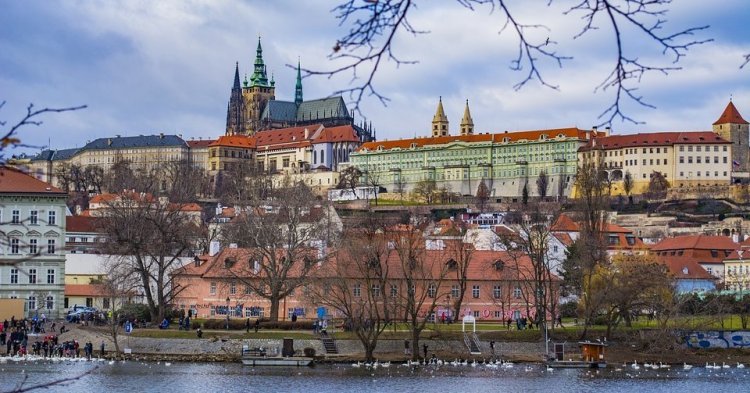Dependent on politics
The media outlets in the Czech Republic are split into two categories: the public service media which is paid for by taxpayers, and the privately-owned media. There are three public service media organisations: the Czech Television (CT), the Czech Radio (CRo) and the Czech Press Agency (CTK).
While all of these organisations are generally considered as reliable and high-quality sources of information, they aren’t immune to political influence. As the European Federation of Journalists has reported, the parliament and the government can refuse to approve the annual reports of the media organisations that could lead to a change of the board of directors in these outlets. In other words, the public service media are financially dependent on politicians who could potentially use their power to reelect the people in charge.
The result of this could be a complete loss of independence of the public service media. The issue is becoming more and more relevant, as in 2020 a third of the councils’ members are to be changed. Depending on who gets in, the personal changes in the councils could have grave consequences on the press freedom in the country.
Owned by the rich
At the first glance, the media landscape in the Czech Republic is quite colourful. Apart from the public service media, the country of 10 million is home to everything from aggressive tabloids, lifestyle magazines and nationalist propaganda outlets, all the way to serious press reporting on the political situation in the country.
The diversity of the Czech media, however, loses some of its colours once we examine the people in charge. Just a decade ago the majority of media groups and publishing houses belonged to foreigners. But these have recently been replaced by the rich. Most of the biggest publishing houses in the Czech Republic are currently owned by local millionaires and billionaires, many of whom amassed their wealth during the years of privatisation following the Velvet Revolution in 1989. Although these people are often businessmen, some of them have proven to have used their media to influence public opinion or elections.
The Reporters Sans Frontières (RSF) index mentions the wealthiest of them – Petr Kellner and his Central European Media Enterprises (CME) media group. It was Kellner, the owner of the most watched commercial TV station, who was found to have been funding to improve China’s image in the mass media. While he denies any political reasons for his involvement, his attempts to influence public view on a foreign power are alarming. Not only does it mean that he uses his wealth to decide what journalists should write about, but it also sets a dangerous precedent for other media moguls who might want to steer the country’s foreign politics in a certain direction. Moreover, his actions in relation to China are actively undermining both the Czech foreign policy (which isn’t completely supportive of China) and democracy itself.
Another, and probably the most interesting, player in this field is Andrej Babiš, the current prime minister and one of the country’s richest people. He currently owns the MAFRA media group – a home to some of the most popular outlets in the Czech Republic. When buying the group in 2013, Babiš, who became a member of the Parliament that very year, promised that he would not use this purchase to influence the press in any way.
As in the case of Kellner, his words turned out to be empty. The acquisition of MAFRA was followed by multiple journalists resigning from their jobs in protest. Since then, Babiš has been accused of conflict of interest, as well as influencing the coverage of himself and his party. These accusations were particularly strong before the parliamentary elections in 2017 when a secret recording was released on Twitter, capturing Babiš telling an employee of MAFRA when and what to publish about his political opponents, in order to improve his chances in the elections. Despite this incident and several scandals including tax evasion, multiple conflicts of interest, and fraud regarding the use of EU subsidies, Babiš still won the elections, becoming the country’s prime minister and oligarch.
Attacked by the powerful
RSF mentions “violence against journalists” and “verbal attacks […] by officials at the highest level”. While many Czech politicians are complacent in these acts, none is as influential or as calculated as president Miloš Zeman. He was elected in 2013, the same year Andrej Babiš bought MAFRA and entered the Parliament. His election was the first direct presidential election in the country and was preceded by a dirty political campaign on the side of Zeman which carries on today.
The citizens got a bitter taste of the new president’s attitude towards journalists in his inauguration speech, where he described the media as “an island of negative deviation” and asked for the citizens’ help to fight it. His strategy has since been to limit his appearance on the public television and to pick carefully which outlets he allows to interview him, perhaps in order to avoid problematic questions and topics. By doing so, Zeman effectively normalised a situation in which the head of the country’s actions are not critically discussed in public. Journalists critical of the president have now lost the ability to confront him in person to question him. Only certain chosen broadcasters or newspapers get the opportunity to interview him.
Zeman has created an atmosphere of hate towards journalists critical of him or the prime minister. His remarks about how he would “liquidate journalists” were even recorded during his conversation with Russia’s Vladimir Putin. This atmosphere seemed to have culminated during a party celebrating Zeman’s second successful presidential election in 2017. During the celebration, a group of journalists and media workers were physically attacked, unprovoked, by the members of Zeman’s campaign team, after they captured one of them drunk on camera.
These examples show clearly how Zeman undermines the public trust in the media and the real-life consequences these actions have. As a president, he is in a powerful position to direct the discourse on the media and journalists. Instead of being a leader, a unifying factor, he chooses to polarise society and to spread an atmosphere of fear and hate.
By constantly insinuating the ‘evil’ in journalists and the possibility of disposing of that evil by violent means, he normalises these ideas. If the president, the representational figure of a country, talks like this, these messages are subconsciously perceived as right, normal or common-sense. As seen, this could lead to verbal threats and outright physical violence towards journalists. Or, taking the example of the murdered Slovak journalist Jan Kuciak, something even worse.
It is clear that the freedom of the press is tightening in the Czech Republic. The country’s prime minister and the leader of the biggest governing party owns a big portion of the mass media, arguably using it to affect his political preferences. The rest of the commercial mass media is mostly owned by rich media moguls with unclear or clearly political motives. The president openly attacks the press, even in the presence of other world leaders, feeding into the public distrust of the media and the polarization of the Czech society. And finally, the public media are struggling to keep their independence.
All of these are the results of a gradual process, taking place throughout the last decade or longer. However, as the RSF index clearly shows, its results are surfacing faster and faster. Where this development could end is hard to predict. But one doesn’t have to look far to see what the lack of a strong journalist voice can lead to.
Freedoms and rights disappearing for the benefit of politicians in Hungary and Poland, together with a murdered journalist in Slovakia are glaring warning signs for the possible future of the Czech Republic.


Follow the comments: |
|
